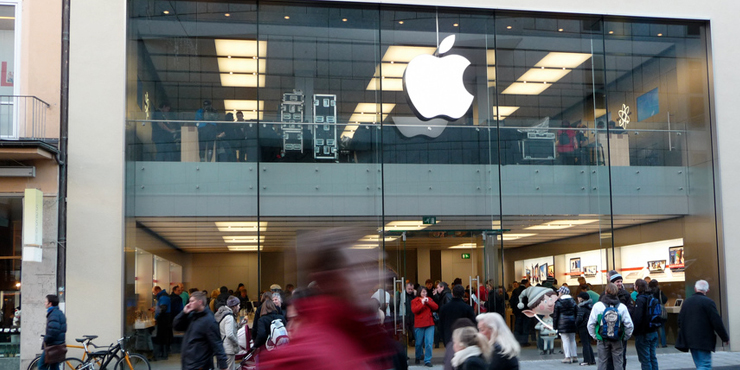Jordan Golson, an Apple Store employee in New Hampshire, sold 750,000 dollars worth of Mac products in a mere three month stint. During the same time, he was personally grossing 11.25 an hour. In his interview with The New York Times, he lamented that, “part of me was thinking, ‘This is great. I’m an Apple fan, the store is doing really well.’ But when you look at the amount of money the company is making and then you look at your paycheck, it’s kind of tough.” Apple topped Exxon Mobil as the richest company in the world this year, to the tune of 453 billion dollars. They rake in the most money per square footage of any retailer in the United States. Apple is a powerhouse of current and future investment across the globe, but what of the implications of being a large employer of mostly college-educated “twenty-somethings” that make, on average, a base pay of 11.90 an hour? The New York Times article “Apple’s Retail Army” noted one key facet of the company: “Apple can do something unique in the annals of retailing: pay a modest hourly wage, and no commission, to employees who typically have college degrees and who at the highest performing levels can move as much as $3 million in goods a year.” For comparison, Nordstrom, Home Depot, and Sephora boast a higher average pay for their sales associates. Tiffany’s, the United State’s second highest grossing retailer per square foot, pays an average base hourly wage of $15.60.
Employees complain of a lack of upward mobility and the fact that, other than the management of an Apple Store, there are few positions left to aspire to; there is also an extremely slim chance of going from Apple Retail to Apple R&D. The devout following that Apple has garnered helps fill its ranks with loyal employees, who speak of a love affair that soon fades as they work for a rigid company that values punctuality and crisp corporate adherence to image rather than personalized or opinionated technical sales assistance. This is not to say that Apple is the only shrewd retailer that knows how image as well as uniform conformity across personnel and shopping experience is key for profit growth, but there is certainly a conflict with the common consumer perspective – that Apple is a glowing white kingdom of technological perfection and forward thinking, quasi-green technology for and of the people. In many ways, Apple is like Abercrombie and Fitch, whose employees past and present speak of the horrors of a ‘Barbie and Ken’ construction of perpetuated beauty, smell, and uniformity. (Read more from a former A&F employee’s AMA on Reddit.com)
One could relate the scandals of worker abuse in China to the unique exploitation of youthful workers in the United States, who by comparison, make exorbitant sums of money when compared to their Chinese counterparts. We should be mindful that our love for Apple software and machines sustains a global supply chain where the richest company in the world relies on some of the poorest people to make some of the most desirable products. Apple is merely one example in the “free market” capitalistic wonderland of low overhead and steep prices, but a mindful consumer should at least know of the implications of their shiny white keyboard, much like the one that was used to type this article.
Read more at NY Times


What can I say? Hipsters want to be hip.
IMO, if they don’t think they’re getting paid enough, then they should work somewhere else. The price they’re getting paid is what that type of labor is worth. If this were a dangerous, arduous, or highly skilled job I would be sympathetic, but it’s just retail. $11.90/hr is a liveable wage most places. Not bad at all for base pay. It’s better than the $9/hr I used to get working retail.
I do have a problem with Apple’s terrible Chinese labor practices, though. That is an entirely different story.
Apple sells itself